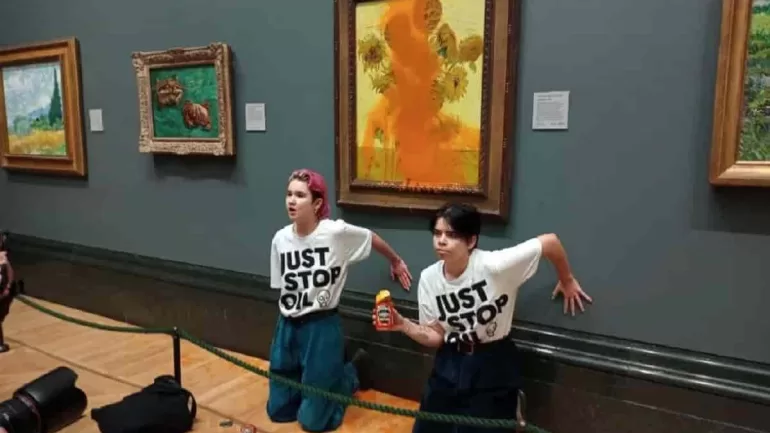ART & DESIGN
Just Stop Oil activists and climate protesters hold a demonstration as they throw cans of tomato soup at Vincent van Gogh’s Sunflowers, 1888, at the National Gallery in London, United Kingdom, 2022. Photo: Just Stop Oil
The sentencing of Just Stop Oil activists sparks debate about art and activism. Discover the implications of their protest and what it means for society
BY KAZEEM ADELEKE, ARTCENTRON
On September 27, 2023, Phoebe Plummer and Anna Holland, two activists from the protest group Just Stop Oil, received prison sentences for their controversial action involving Vincent van Gogh’s iconic painting, Sunflowers (1888). This incident, which took place in October 2022 at London’s National Gallery, sparked a significant debate about the intersection of art, activism, and legal boundaries.
Plummer and Holland made headlines when they hurled cans of tomato soup at Van Gogh’s masterpiece before super-gluing their hands to the wall. While the glass protected and kept the painting undamaged, the 17th-century frame sustained minor damage, resulting in an estimated repair cost of up to £10,000. This act was part of a broader strategy by Just Stop Oil to raise awareness about climate change and pressure the UK government to take immediate action.
Just Stop Oil Activists: Activism and Legal Ramification
During a TikTok video post following the protest, Plummer articulated their motivations, stating, “We’re not asking the question, should everyone be throwing soup at paintings? What we’re doing is getting the conversation going so we can ask the questions that matter.” This statement highlights the activist’s intention to provoke thought and discussion around critical issues like climate change and societal responsibilities.
The legal consequences for Plummer and Holland were severe. Judge Christopher Hehir of Southwark Crown Court sentenced Plummer to two years and three months, while Holland received 20 months. Hehir condemned their actions, emphasizing that they “couldn’t have cared less” if the painting had been ruined. This assertion reflects the court’s view on the gravity of their actions, despite the lack of permanent damage to the artwork itself.
A wave of support emerged from the art community in response to the sentences. Over 100 artists, curators, and art historians signed an open letter advocating against the imprisonment of the activists. Greenpeace UK and the art collective Liberate Tate organized this letter to position the protest as an act of artistic expression rather than vandalism. They argued that the soup-splashing incident connected with a long-standing tradition of creative “iconoclasm” in the arts.
Creative iconoclasm is the deliberate destruction or alteration of artistic works to challenge societal norms and provoke thought. Historical examples include Robert Rauschenberg, who famously erased a drawing by Willem de Kooning, and Jake and Dinos Chapman, who altered Goya’s Disasters of War prints. The signatories of the letter suggested that Plummer and Holland’s protest resembled historical precedents. Their contention, therefore, was that it should be viewed as a legitimate commentary on the urgent climate crisis rather than a destructive act.
The Bigger Picture: Climate Crisis and Art
The protest by Just Stop Oil was not merely about the act itself but served as a powerful metaphor for the climate crisis affecting the globe. Activists argue that artistic expression can play a crucial role in raising awareness about critical social issues. By targeting revered artwork, they aimed to draw public attention to the pressing need for governmental action on climate change.
In her closing statements, Plummer noted the moral implications of their actions, suggesting that sometimes “morality is different from the law.” According to her, the intentions behind the protest were to “shine a light on the climate crisis and the cost of living crisis.” Above all, to inspire a broader conversation about societal responsibility.
Just Stop Oil Activists Sentencing: Public Response and Continuing Activism
The public had a mixed response following the sentencing. While many condemned the actions as reckless and damaging to cultural heritage, others celebrated the protest as a bold statement about the urgency of climate action. The issue’s complexities reveal a growing divide in society regarding the methods of protest and the ethical implications of targeting art for activism.
Just hours after the sentencing announcement, another group of Just Stop Oil activists returned to the National Gallery. They threw soup on two Sunflowers paintings, including the same piece targeted by Plummer and Holland. This continued act of defiance underscores the movement’s commitment to their cause and the lengths activists are willing to go to make their voices heard.
The Intersection of Art, Activism, and Law
The case of Phoebe Plummer and Anna Holland raises profound questions about the intersection of art, activism, and the law. While the legal system views their actions as criminal, many in the art community see it as a necessary form of protest that aligns with the broader artistic tradition of questioning societal values and norms.
As society grapples with the realities of climate change, the role of artists and activists will remain pivotal in driving conversations and actions. The debate over the appropriate methods of protest continues, challenging us to consider the boundaries between legal conduct and moral responsibility in the pursuit of a better future.
